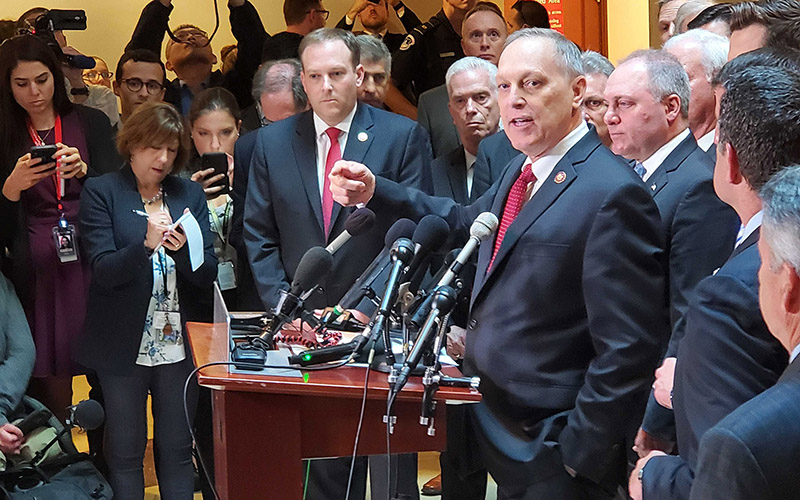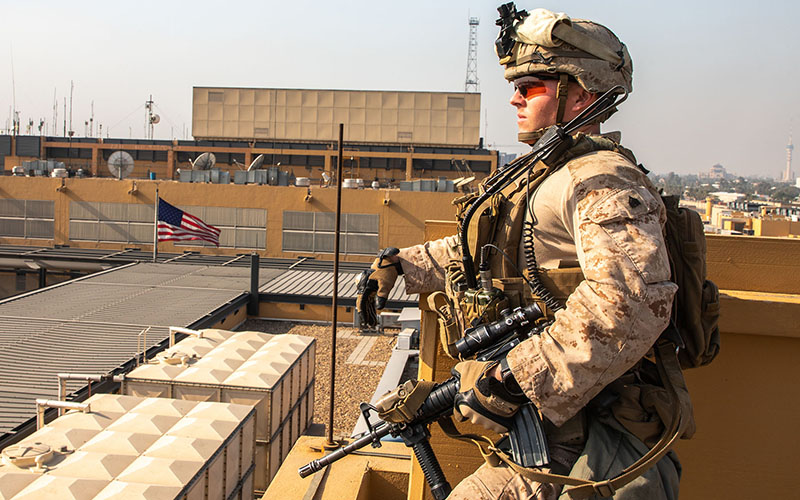WASHINGTON – Arizona Reps. Andy Biggs and David Schweikert were among just 11 Republicans who crossed party lines Thursday as the House voted to limit the president’s ability to pursue military action without approval from Congress.
The vote to revoke the 2002 Authorization for Use of Military Force came just moments after the House – with almost no GOP support – approved a separate measure to prohibit war with Iran unless Congress gave its approval.
The AUMF was approved in the wake of 9/11 to give the president leeway to take action against terrorists, and again in 2002 before the U.S invasion of Iraq. But it has been used to justify a number of military actions since then and critics said it’s time for Congress to reassert its war-making authority.
“Proud to vote for both of these amendments today and #StopEndlessWars,” Rep. Raul Grijalva, D-Tucson, said in a tweet Thursday.
While they agreed that the AUMF needs to be updated, most opponents of the measures said it sends the wrong message to repeal it now, when tensions with Iran are high.
“If Iran doubts our resolve to respond forcefully, it will surely affect their calculus moving forward about whether to attack America again,” said Rep. Michael McCaul, R-Texas, speaking against the repeal on the House floor.
Arizona’s delegation split on party lines for the measure prohibiting war with Iran, with four Democrats supporting and four Republicans opposing the measure, which passed 228-175.
Reps. Debbie Lesko, R-Peoria, and Paul Gosar, R-Prescott, voted against the repeal of AUMF, while Biggs and Schweikert joined the four Democrats to support the measure that passed on a 236-166 vote.
Rep. Ann Kirkpatrick, D-Tucson, did not vote. She announced earlier this month that she would be taking leave to get treatment for alcohol dependence.
Neither Biggs, of Gilbert, nor Schweikert, of Fountain Hills, responded to requests for comment Thursday on their votes. But in an editorial before the vote, Biggs and Rep. Warren Davidson, R-Ohio, amounts to “a blank check to deploy troops in the Middle East against almost any enemy.”
Biggs and Davidson said a new authorization, limited to addressing terrorism, should be enacted to keep America safe.
“A new authorization with these criteria would move us away from endless wars that Americans recognize are damaging to the country,” they wrote. “Congress can direct us instead to peace and prosperity – if only it would reclaim its power.”
While he is chairman of the conservative Freedom Caucus, Biggs is also co-founder with liberal Rep. Ro Khanna, D-Calif., of the bipartisan War Powers Caucus. Khanna sponsored Thursday’s Iran war ban measure while another member of the War Powers Caucus, Rep. Barbara Lee, D-Calif., authored the AUMF repeal.
At least one foreign policy expert questioned the timing of the move, which he said is not likely to pass in the Senate.
“Simply eliminating it without providing new authority (even if more circumscribed) to carry out ongoing operations would be a mistake,” Michael O’Hanlon, a senior foreign policy fellow at the Brookings Institution, said in an email.
“So it’s not necessarily good policy, and the Senate probably won’t support it, and the president will surely veto it in any case,” O’Hanlon said.
The measures got to the floor as amendments to an otherwise noncontroversial bill authorizing a medal for those who served in the Merchant Marine in World War II, a move Republicans called a Democratic “abuse of power.”

Rep. Andy Biggs, R-Gilbert, is a staunch defender of President Donald Trump’s, but also one of the few Republicans to vote to rein in his war powers. (Photo by Wissam Melhem/Cronkite News)
“By considering these measures as amendments to an unrelated gold medal bill, the majority is intentionally using a partisan procedure gimmick to silence dissenting opinion,” said Rep. Kevin McCarthy, R-Calif., the House minority leader.
It’s the second time this month that the House has voted to rein in President Donald Trump after he ordered a drone strike that killed Iranian Gen. Qassem Soleimani, whom the White House said was plotting imminent attacks on U.S. targets.
Minority whip Rep. Steve Scalise, R-La., defended Trump’s use of AUMF for that strike and said on the House floor that revoking it would tie the president’s hands.
Trump sent mixed signals in the leadup to the vote, urging lawmakers in a Wednesday tweet to “vote their HEART,” but later tweeting “Democrats want to make it harder for Presidents to defend America.”
But Rep. Matt Gaetz, R-Fla., a staunch Trump defender, said voting for repeal of AUMF is just the right thing to do.
“Keeping U.S. forces in Iraq is not what President Trump wants, it’s not what the American people want,” Gaetz said. “The best time to vote against the Iraq war would’ve been in 2002, and the second-best time is today.”


